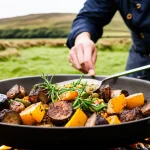Key Weather-Related Challenges for Year-Round Camping in the UK
Understanding UK camping weather is essential for anyone planning year-round outdoor adventures. The British climate is famously unpredictable, bringing a mix of rain, wind, and temperature swings that affect every season differently.
Rain is the most persistent challenge. Frequent showers can turn campsites muddy and uncomfortable, so waterproof tents and gear are indispensable for coping with seasonal weather challenges. Wind worsens this by threatening tent stability—strong gusts can damage poles or cause tents to collapse, making campsite safety a priority.
Topic to read : What are the must-visit UK campsites for food lovers?
Temperature fluctuations also pose difficulties. Summer offers pleasant warmth but can be accompanied by cold nights, while winter months bring freezing cold and frost, requiring advanced insulation and clothing to maintain comfort and safety.
Daylight variation further complicates matters. Long summer days allow extended camping activities, whereas shorter daylight in autumn and winter limits outdoor time, increasing reliance on quality lighting and heat sources. Navigating these factors is key to overcoming camping difficulties by season in the ever-changing British climate.
Also read : Are There Hidden Gems in UK Campsites Worth Discovering?
Essential Equipment and Gear Adjustments by Season
Adapting your camping gear UK to the season is crucial for comfort and safety. In wet conditions, prioritize all-weather camping gear with superior waterproofing. A reliable shelter featuring a high-graded rainfly and sealed seams prevents water ingress. Additionally, waterproof clothing layers safeguard against chilly dampness, while breathable fabrics manage moisture inside.
For cold seasons, upgrade insulation in your sleeping systems and clothing layers. Thermal sleeping bags rated for lower temperatures and insulated sleeping mats provide vital warmth from the ground. Layering multiple clothing items allows easy temperature control. Ventilation remains essential, particularly to prevent condensation buildup in enclosed shelters, maintaining a dry environment.
During hot weather, select lightweight, breathable garments and shelters with ample ventilation. Sun protection becomes part of your essential camping equipment, including wide-brimmed hats and UV-resistant fabrics. Assess your gear’s ventilation options to reduce heat stress.
Evaluating your seasonal camping kit involves balancing waterproofing, insulation, and ventilation tailored to the species of conditions expected. Upgrading key items ensures your outdoor experience remains pleasant, safe, and rewarding throughout the year.
Accessibility and Availability of Camping Sites Throughout the Year
Seasonal camping sites in the UK vary significantly in availability and facilities depending on the time of year. Many established UK campsites open primarily during warmer months, closing or limiting services off-season to protect the environment and reduce costs. This means that campers planning trips outside peak times should prepare for fewer amenities and possibly unexpected closures.
Wild camping legalities are a crucial consideration. Unlike many European countries, wild camping is not broadly permitted in the UK without landowner permission. Understanding these legal restrictions helps avoid fines and preserves natural areas. However, some remote locations allow discreet wild camping under the principle of responsible access.
Booking ahead is essential, especially for popular UK campsites, as demand surges during summer months and holidays. Conversely, off-season camping offers the chance to explore quieter, less crowded sites but requires careful planning and checking availability. For those seeking adventure, combining knowledge of seasonal camping sites with respect for wild camping legalities creates the best experience year-round.
Wildlife Encounters and Natural Hazards by Season
Understanding UK wildlife camping risks changes with the seasons is vital for safety. In spring and summer, midges and ticks become prominent insect hazards. Midges, tiny but irritating, thrive in damp, warm environments, especially near water. Ticks can carry Lyme disease, so wearing protective clothing and checking skin after walks is crucial for outdoor safety UK.
Badgers and foxes, common mammals, vary in activity depending on the time of year. Foxes are mostly nocturnal scavengers, often attracted by food left outside, so minimising food and rubbish impact is vital year-round. Badger setts are usually undisturbed if campers avoid heavy foot traffic near their burrows.
Plant hazards such as nettles sting during the warmer months, while certain fungi, sometimes poisonous, emerge in autumn. Recognising these hazards helps prevent unpleasant encounters. By adjusting habits seasonally and managing waste carefully, campers can enjoy the outdoors safely and respectfully while minimising wildlife disturbance.
Safety Considerations and Health Risks in All Four Seasons
Camping safety UK demands attention to seasonal health risks camping enthusiasts face throughout the year. In cold weather, risks like hypothermia and frostbite are critical. To prevent these, dress in layers, keep dry, and use insulated sleeping gear. Recognising early signs of hypothermia—shivering, confusion—and frostbite—numbness, pale skin—enables timely action.
Summer introduces challenges such as heat exhaustion, dehydration, and sunburn. Campers should drink plenty of water, wear hats, and apply sunscreen regularly to mitigate these risks. Awareness of these dangers helps maintain wellbeing during warmer months.
Isolation in remote locations intensifies the need for emergency preparedness. Carrying a comprehensive first aid camping kit, knowing basic first aid techniques, and having communication devices are essential strategies year-round. Preparing for unexpected emergencies increases safety and confidence in outdoor settings regardless of the season.
Practical Preparation and Expert Tips for UK Camping Success
Insights from seasoned campers and essential advice for all experience levels
When tackling UK camping advice, preparation is key. The UK’s weather can shift rapidly, so flexible itineraries are vital. Expert campers recommend packing layers and waterproof gear to manage unexpected rain and temperature changes. This flexibility allows you to enjoy your trip fully, no matter what the skies bring.
Seasoned campers emphasize learning from first-hand camping experiences. For instance, setting up camp earlier in the day avoids last-minute stress if weather conditions worsen. Another tip is to scout your site beforehand, ensuring the ground is suitable and safe, which significantly improves comfort and safety.
For novices, starting with well-established campsites after thorough research can ease the transition into outdoor living. Experienced campers often suggest investing in multi-season tents and versatile cooking equipment, which enhance year-round enjoyment.
Adopting these practical, well-tested preparation tips boosts confidence and comfort, turning a potentially daunting UK camping trip into an enjoyable, memorable adventure.


